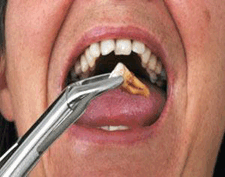المقالات
Wisdom Teeth

Your last molars, called the third molars or wisdom teeth, typically begin to come in (erupt) during the late teen years or early twenties. When they don't have room to grow in, or they're trapped in your jaw because they are tilted or rotated, they are impacted.
neighboring tooth, causing pain and possibly damaging the tooth.
breeding ground for the bacteria that cause decay and periodontal (gum) disease.
tooth, and this infection can spread into the face and jaw.
You can avoid the pain and possible damaging effects of an impacted wisdom tooth by having it removed early, before its roots are fully developed. We can monitor the development of your wisdom teeth with X-rays, and remove them as soon as we determine that they will likely cause difficulties.
Even if your wisdom teeth came in properly, they can still cause problems. They're located at the back of your mouth, making them extremely difficult to brush and floss, so it's easy for plaque to collect on them. Plaque buildup can cause decay and periodontal disease, which can result in a host of other difficulties. For these reasons, we'll usually recommend removing wisdom teeth, even if they've emerged.
Before we begin Before we remove your wisdom teeth, we'll thoroughly examine your mouth and teeth, and we'll also take X-rays of the teeth we're going to remove so we can evaluate their roots and the bone that surrounds them. Be sure to tell us about any medical conditions you may have, or problems you've had with previous extractions. You'll also need to tell us about any medications or supplements you're taking, including aspirin, ibuprofen, herbal supplements and any other over-the-counter medicines. If you take oral contraceptives, we'll need to know about that, too, as you could be prone to more problems with healing.
You may feel a bit groggy after the procedure, so you should arrange to have someone pick you up when you're done. Then, to minimize problems after your tooth is removed, you ll need to follow our post-operative instructions carefully, especially for the first 24 hours. These instructions will tell you how to control bleeding, how to relieve pain and minimize swelling, how to prevent dry socket, and what to eat and not eat. We 'll also give you a prescription for a pain reliever, which will help to keep you comfortable. We may also prescribe an antibiotic; be sure to follow the directions precisely.
An appointment to have all four of your wisdom teeth removed usually takes only an hour or two. Before we begin, we'll use anesthetic to numb the entire area around the teeth so you'll be comfortable throughout the procedure.
If your wisdom teeth haven't yet erupted (grown in) above the gum line, we'll remove them through a small incision in your gums. To remove the wisdom teeth, we'll use either forceps or an instrument called an "elevator." Elevators are placed next to your tooth, and are used to gently roll it out of its socket. Forceps carefully grip the tooth so we can remove it.
As the tooth is removed, you'll feel pressure, but not pain. If you feel any discomfort beyond just a sensation of pressure, be sure to let us know. We'll stop immediately and give you more anesthetic.
Sometimes, if your tooth's roots are curved or are tightly held in the socket, we might need to cut the tooth into sections and remove them one at a time. This is a very common practice, that can significantly reduce the amount of time and effort needed to remove an impacted wisdom tooth. Once the tooth is removed, if an incision was necessary we'll close it with a couple of stitches.
A few lucky people are able to keep their wisdom teeth, use them, and take proper care of them. In most cases, though, keeping wisdom teeth isn't possible, and wisdom teeth have to be removed. In these cases, delaying removal can cause serious problems.
W hat are your choices for treating wisdom teeth? Because of these many serious problems, it's usually better to remove wisdom teeth early, even before they break through the gums.
An impacted wisdom tooth is one that hasn't come in or has come in only partially. Sometimes an impacted wisdom tooth can become infected. This can be excruciatingly painful. This is a common dental emergency and can cause pain for days, even after antibiotics are started, and can even be life threatening.
An impacted wisdom tooth may push on other teeth. A misaligned wisdom tooth can also cause cavities in the tooth next to it because the area where they touch can't be kept free of bacteria and plaque.
Wisdom teeth are nearly impossible to keep free of plaque, even when the rest of the teeth are completely free of plaque. In addition to cavities, plaque also causes periodontal disease, which may start near the wisdom teeth and spread throughout the mouth.
Sometimes cysts form around impacted wisdom teeth, and cysts can destroy a tremendous amount of bone before they're noticed and sometimes require surgery to repair.
With time, the roots of wisdom teeth may grow around a nerve in the jaw, which can then be damaged during extraction. This could leave your lip and chin permanently numb.
